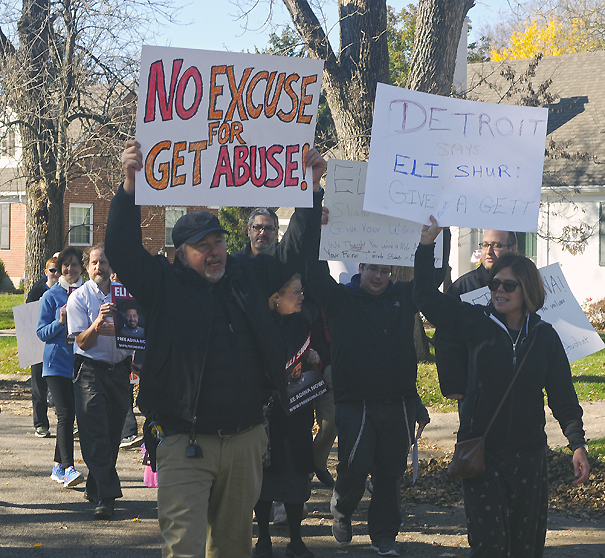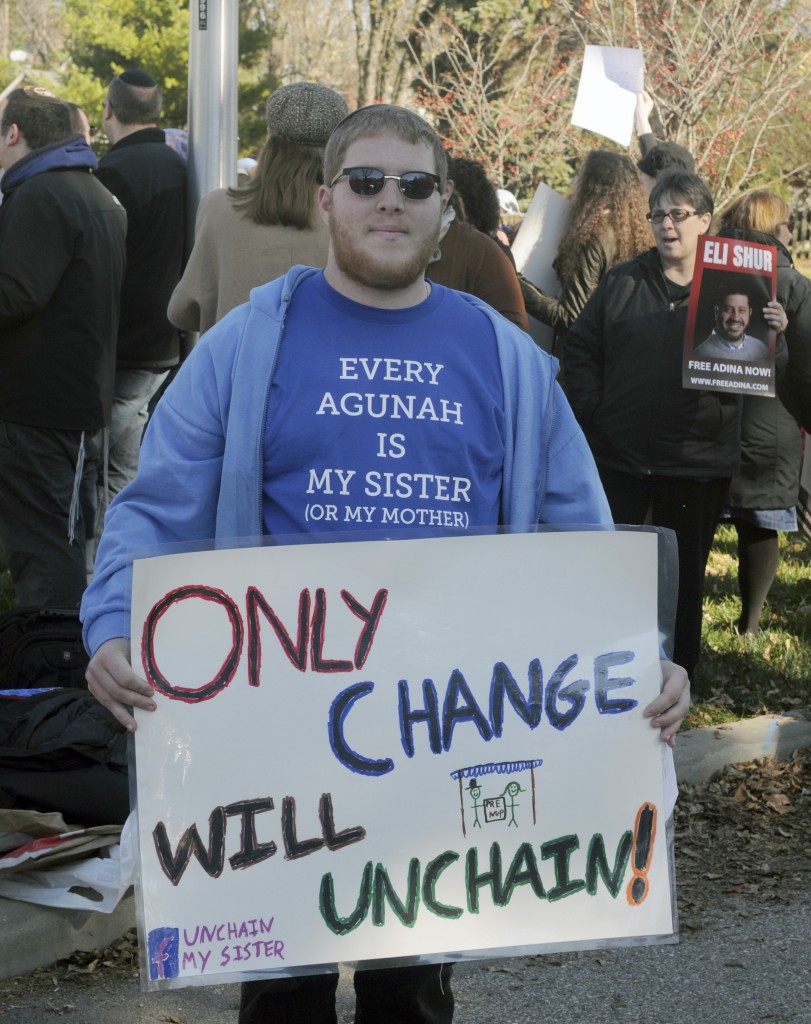Agunah rally impassioned, respectful

Orthodox demonstrators from Michigan and across Ohio converge on Dayton suburb
Story and Photos By Michelle Tedford, Special To The Dayton Jewish Observer
KETTERING, OHIO — More than 80 demonstrators stood along Far Hills Avenue in Kettering, Ohio, as passing cars slowed to read their signs: “Eli Shur. Free Adina Now.”
The rally, held Sunday, Nov. 8, primarily drew supporters from Orthodox communities across Ohio and Michigan, including a handful of Orthodox and non-Orthodox Jews from the Dayton area. It was organized by the New York-based Organization for the Resolution of Agunot (ORA). Agunot refers to the plight of women in the Orthodox world whose husbands refuse to provide them with a get, a religious bill of divorce.
Rabbi Jeremy Stern, executive director of ORA, said the demonstration was part of ORA’s increasing attempts to pressure Kettering resident Dovid Porat, known locally as Eli Shur, to grant a get to his wife, Adina Porat. She and her five children live in Israel.
According to ORA, in 2007, Shur left his family and has refused to provide his wife with a get. Within halacha (Jewish law), a divorce isn’t final until a husband provides his wife with a get. Without one, an agunah is unable to remarry.
The demonstrators were impassioned but respectful; Stern said they followed the rules outlined by the Kettering Police Department. The rally included a march past the white brick home where Shur lives, according to ORA.
“We have very few options for what we can do,” said Stern, whose organization annually works on about 60 agunah cases and conducts about two dozen demonstrations each year.
“This is what we can do: Assert our First Amendment rights of freedom of speech, freedom of assembly, and state factual information that he’s refusing to give his wife a get. It’s a form of domestic abuse. It’s shameful.”
Stern said one goal of the demonstration was to shame Shur and inform his neighbors in the hopes that they will also pressure Shur to grant the get.
He approached Shur’s house during the demonstration. His intention, he said, was to present Shur with the documents for an issuance of the get. If Shur signed it, Stern said the demonstration would have been called off. No one answered the door.
Attendees had various motivations for participating. Rabbi Mel Granatstein and his wife, Malka, traveled with others from Cleveland. The Granatsteins know the parents of Adina Porat and said they came to support the family.
Rabbi Yechiel Morris organized a busload of 17 protestors from Akiva Hebrew Day School in Southfield, Mich. Morris said Shur and his wife taught at the school in the late 1990s.
“Students who once looked up to him as a role model now see him acting this way,” Morris said. “We believe withholding this get is a form of domestic abuse.”
While many demonstrators said they learned of the rally through ORA’s social media campaign, Dayton attendees learned of it in other ways.
Elisheva Malloy from Oakwood was conflicted about joining the protest. But she attended with her daughter, Meaghan. Elisheva Malloy is friends with the woman Shur is living with.
“I care about everyone in the Jewish community,” Elisheva Malloy said. “I just think it’s wrong that someone’s life is in limbo.”
Marci Vandersluis of Oakwood and Susan and Dr. David Joffe of Kettering learned of the demonstration through family and friends in Cleveland and Chicago.
“We think it’s wrong, and we want to support this woman to get on with her life,” Vandersluis said.
Education about agunot was an objective of the weekend, which began with teaching sessions at Torat Emet, a modern Orthodox synagogue in Columbus. ORA conducted classes about matrimony at Torat Emet, endorsing the use of halachic prenuptial agreements to ensure the granting of a get when the marriage is over. ORA also encouraged the matrimony class participants to travel to Dayton for the demonstration.
Meagan Buren of Columbus attended the matrimony classes at Torat Emet. She said she came to the rally to support Dayton’s community.
“Just because it’s a small community doesn’t mean it should be forgotten, and we’re here to offer it support,” Buren said.
Menachem Roetter from Oak Park, Mich. said he came to the demonstration to support all chained women — including his mother, an agunah for 13 years.

In Dayton, Shur is the owner of Shur Wellbeing and works as a life, leadership, health and fitness coach. Since ORA put up the freeadina.com website and video interview with Adina Porat on Oct. 21 — and both went viral overnight — he pulled down Shur Wellbeing’s website.
In 2010, Shur arrived in Dayton to serve as ritual director of Beth Jacob Congregation. He had presented himself as a single man with no children. Nearly six months later, volunteers with ORA showed up at one of Shur’s evening classes at the synagogue and urged him to sign a get for his wife. He refused. In short order, Shur was no longer employed by the synagogue.
Stern said ORA chose the date for the rally two months ago to coincide with the Columbus study session. As it turned out, a number of rabbis and other leaders in the Dayton Jewish community were out of town at conferences on Nov. 8: at Jewish Federations of North America’s General Assembly in Washington, D.C.; Union of Reform Judaism’s Biennial in Orlando; and Chabad-Lubavitch’s International Conference of Shluchim and Shluchos (emissaries) in Brooklyn. Stern said this was an unintentional oversight.
The article on the plight of Adina Porat posted at Daytonjewishobserver.org prompted Rabbi Joshua Ginsberg at Dayton’s Beth Abraham Synagogue — the community’s only Conservative congregation — to lead a study session about the issue of agunot following Shabbat services and Kiddush lunch on the day before the rally.
Ginsberg said about 30 congregants stayed for the session, which presented the underlying issues and source texts, how Jewish law has handled divorce, and possible solutions available in rabbinic literature and contemporary society.
“When they were laid out, some in attendance found it surprising, others perplexing, and some even disturbing,” Ginsberg said.
He said that in the 1950s, the Conservative movement adopted a solution to the issue of agunot. Marriage now includes the addition of a clause in the ketubah, the bride’s marriage contract, that stipulates divorce will be adjudicated by a bet din (rabbinic court) to prevent the problem.
He also urged his congregants who have unmarried Orthodox family members to be aware of the need for prenuptial agreements to allow for religious dissolution of the marriage.
“Even if they are not directly affected, this issue affects all of Judaism,” Ginsberg said.

While the New York-based Jewish Orthodox Feminist Alliance encourages prenuptials, it also advocates for changes to rabbinic law that would better protect all women, said Sharon Weiss-Greenberg, JOFA executive directive.
“Religion should not allow for or provide groundings for a man to abuse a wife,” she said.
The fact that two decades after prenuptial agreements began being used, all rabbis still do not require them means a halachic solution is required, Weiss-Greenberg said.
“There are hundreds of women out there who are waiting and waiting and waiting,” she said.
Aviad Tabory, from the Israeli settlement of Alon Shevut, attended the demonstration to thank the attendees for their support of his sister, Adina.
“To see so many people come together and help one another, it’s a very old Jewish ideal that is alive today,” Tabory said.
ORA’s Stern said that his organization is considering its next actions against Shur.
“There has been a lot going on behind the scenes and, due to the pressure of the rally, we have started to see important progress towards resolving the case,” he said. “We will continue to pressure Eli as effectively as possible until he finally gives Adina a get.”
Marshall Weiss contributed to this report.


